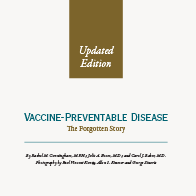Unprotected People Stories is a collection of more than 100 personal accounts and case reports about diseases that vaccines prevent.
These stories remind us why vaccines are essential to protecting and preserving our public health and counterbalance anti-vaccine news stories.
Because immunization has been so successful, vaccine-preventable diseases such as diphtheria and polio are fading from our consciousness.
Healthcare professionals may share these real-life stories of people who have suffered or died from vaccine-preventable diseases with their patients.
Choose a topic in the menu to get started.







